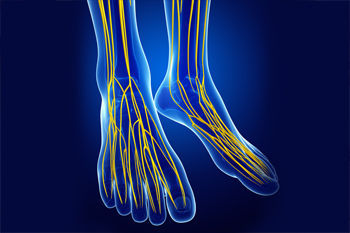Items filtered by date: February 2022
Is My Broken Foot an Emergency?
 The foot consists of 26 bones. When one or more of these bones are broken, it is known as a foot fracture. Although it may sound frightening, a broken foot is not always an emergency. Whether or not you should rush to the ER depends on the severity of the injury. If you are experiencing mild pain, swelling, and bruising, you should schedule an appointment with a podiatrist. If, however, you have moderate to severe pain, swelling, bruising, visible deformity, numbness, coldness, or discoloration in the injured foot, it is strongly suggested that you seek emergency treatment. For more information about foot fractures, please consult with a podiatrist.
The foot consists of 26 bones. When one or more of these bones are broken, it is known as a foot fracture. Although it may sound frightening, a broken foot is not always an emergency. Whether or not you should rush to the ER depends on the severity of the injury. If you are experiencing mild pain, swelling, and bruising, you should schedule an appointment with a podiatrist. If, however, you have moderate to severe pain, swelling, bruising, visible deformity, numbness, coldness, or discoloration in the injured foot, it is strongly suggested that you seek emergency treatment. For more information about foot fractures, please consult with a podiatrist.
A broken foot requires immediate medical attention and treatment. If you need your feet checked, contact one of our podiatrists from Pennsylvania. Our doctors can provide the care you need to keep you pain-free and on your feet.
Broken Foot Causes, Symptoms, and Treatment
A broken foot is caused by one of the bones in the foot typically breaking when bended, crushed, or stretched beyond its natural capabilities. Usually the location of the fracture indicates how the break occurred, whether it was through an object, fall, or any other type of injury.
Common Symptoms of Broken Feet:
- Bruising
- Pain
- Redness
- Swelling
- Blue in color
- Numbness
- Cold
- Misshapen
- Cuts
- Deformities
Those that suspect they have a broken foot shoot seek urgent medical attention where a medical professional could diagnose the severity.
Treatment for broken bones varies depending on the cause, severity and location. Some will require the use of splints, casts or crutches while others could even involve surgery to repair the broken bones. Personal care includes the use of ice and keeping the foot stabilized and elevated.
If you have any questions please feel free to contact one of our offices located in Plymouth Meeting and Ambler, PA . We offer the newest diagnostic and treatment technologies for all your foot and ankle needs.
Reminder: When Was the Last Time...?
What Are the Treatments for Tarsal Tunnel Syndrome?
 Tarsal tunnel syndrome is a condition caused by compression of the posterior tibial nerve, which runs through a canal near the heel and into the sole of the foot. When the posterior tibial nerve is compressed, symptoms such as foot and ankle pain, burning, tingling, and numbness can arise. This condition is typically treated through conservative methods. These include resting and icing the affected foot, taking over-the-counter pain medications, wearing orthotics, immobilizing the foot, physical therapy, and steroid injections. In severe cases where conservative treatments have failed, decompression surgery may be needed. To learn more about tarsal tunnel syndrome, please seek the care of a podiatrist.
Tarsal tunnel syndrome is a condition caused by compression of the posterior tibial nerve, which runs through a canal near the heel and into the sole of the foot. When the posterior tibial nerve is compressed, symptoms such as foot and ankle pain, burning, tingling, and numbness can arise. This condition is typically treated through conservative methods. These include resting and icing the affected foot, taking over-the-counter pain medications, wearing orthotics, immobilizing the foot, physical therapy, and steroid injections. In severe cases where conservative treatments have failed, decompression surgery may be needed. To learn more about tarsal tunnel syndrome, please seek the care of a podiatrist.
Tarsal tunnel syndrome can be very uncomfortable to live with. If you are experiencing tarsal tunnel syndrome, contact one of our podiatrists of Pennsylvania. Our doctors can provide the care you need to keep you pain-free and on your feet.
Tarsal Tunnel Syndrome
Tarsal tunnel syndrome, which can also be called tibial nerve dysfunction, is an uncommon condition of misfiring peripheral nerves in the foot. The tibial nerve is the peripheral nerve in the leg responsible for sensation and movement of the foot and calf muscles. In tarsal tunnel syndrome, the tibial nerve is damaged, causing problems with movement and feeling in the foot of the affected leg.
Common Cause of Tarsal Tunnel Syndrome
- Involves pressure or an injury, direct pressure on the tibial nerve for an extended period of time, sometimes caused by other body structures close by or near the knee.
- Diseases that damage nerves, including diabetes, may cause tarsal tunnel syndrome.
- At times, tarsal tunnel syndrome can appear without an obvious cause in some cases.
The Effects of Tarsal Tunnel Syndrome
- Different sensations, an afflicted person may experience pain, tingling, burning or other unusual sensations in the foot of the affected leg.
- The foot muscles, toes and ankle become weaker, and curling your toes or flexing your foot can become difficult.
- If condition worsens, infections and ulcers may develop on the foot that is experiencing the syndrome.
A physical exam of the leg can help identify the presence of tarsal tunnel syndrome. Medical tests, such as a nerve biopsy, are also used to diagnose the condition. Patients may receive physical therapy and prescriptive medication. In extreme cases, some may require surgery.
If you have any questions please feel free to contact one of our offices located in Plymouth Meeting and Ambler, PA . We offer the newest diagnostic and treatment technologies for all your foot and ankle needs.
Caring for Your Feet When You Have Diabetes
 Because diabetes can bring with it other problems, particularly in your feet, it is a good idea to pay special attention to their care. Symptoms to watch out for include numbness, tingling, and a feeling of pins and needles. In addition, inability to feel hot or cold, discoloration, and pain or burning sensations are common. It is especially important to be aware of cuts that are slow to heal and cracks in the skin. Conditions that can result from neglecting your feet include foot ulcers, bacterial or fungal infections, and swelling. Some home remedies include washing and carefully drying your feet daily, applying moisturizer on them to prevent cracking, and always wearing shoes indoors. By far the most cautious approach to your foot care is to schedule regular visits with a podiatrist who can examine your feet and offer any treatment that becomes necessary.
Because diabetes can bring with it other problems, particularly in your feet, it is a good idea to pay special attention to their care. Symptoms to watch out for include numbness, tingling, and a feeling of pins and needles. In addition, inability to feel hot or cold, discoloration, and pain or burning sensations are common. It is especially important to be aware of cuts that are slow to heal and cracks in the skin. Conditions that can result from neglecting your feet include foot ulcers, bacterial or fungal infections, and swelling. Some home remedies include washing and carefully drying your feet daily, applying moisturizer on them to prevent cracking, and always wearing shoes indoors. By far the most cautious approach to your foot care is to schedule regular visits with a podiatrist who can examine your feet and offer any treatment that becomes necessary.
Diabetic foot care is important in preventing foot ailments such as ulcers. If you are suffering from diabetes or have any other concerns about your feet, contact one of our podiatrists from Pennsylvania. Our doctors can provide the care you need to keep you pain-free and on your feet.
Diabetic Foot Care
Diabetes affects millions of people every year. The condition can damage blood vessels in many parts of the body, especially the feet. Because of this, taking care of your feet is essential if you have diabetes, and having a podiatrist help monitor your foot health is highly recommended.
The Importance of Caring for Your Feet
- Routinely inspect your feet for bruises or sores.
- Wear socks that fit your feet comfortably.
- Wear comfortable shoes that provide adequate support.
Patients with diabetes should have their doctor monitor their blood levels, as blood sugar levels play such a huge role in diabetic care. Monitoring these levels on a regular basis is highly advised.
It is always best to inform your healthcare professional of any concerns you may have regarding your feet, especially for diabetic patients. Early treatment and routine foot examinations are keys to maintaining proper health, especially because severe complications can arise if proper treatment is not applied.
If you have any questions please feel free to contact one of our offices located in Plymouth Meeting and Ambler, PA . We offer the newest diagnostic and treatment technologies for all your foot and ankle needs.
Extensor Tendonitis May Cause Pain in the Top of Your Foot
Pain in the top of the foot can be caused from a variety of conditions, one of them being extensor tendinitis. Tendons are fibrous tissues that connect muscles to bone. Extensor tendons are located on the top of the feet. They connect bones in the toes to muscles on the front portion of the leg which work together to help raise your toes and flex your feet. These tendons can become inflamed and irritated from wearing tight, small, or non-supportive shoes, or from overuse. This condition, known as extensor tendonitis, can cause pain and swelling in the top of the feet that may worsen after activity. If you are experiencing this type of foot pain, it is a good idea to contact a podiatrist. After the examination, if it’s determined that you have extensor tendonitis, your doctor may prescribe a course of treatment that includes rest, anti-inflammatory medication, splinting, physical therapy, or even steroid injections.
Foot Pain
Foot pain can be extremely painful and debilitating. If you have a foot pain, consult with one of our podiatrists from Pennsylvania. Our doctors will assess your condition and provide you with quality foot and ankle treatment.
Causes
Foot pain is a very broad condition that could be caused by one or more ailments. The most common include:
- Bunions
- Hammertoes
- Plantar Fasciitis
- Bone Spurs
- Corns
- Tarsal Tunnel Syndrome
- Ingrown Toenails
- Arthritis (such as Gout, Rheumatoid, and Osteoarthritis)
- Flat Feet
- Injury (from stress fractures, broken toe, foot, ankle, Achilles tendon ruptures, and sprains)
- And more
Diagnosis
To figure out the cause of foot pain, podiatrists utilize several different methods. This can range from simple visual inspections and sensation tests to X-rays and MRI scans. Prior medical history, family medical history, and any recent physical traumatic events will all be taken into consideration for a proper diagnosis.
Treatment
Treatment depends upon the cause of the foot pain. Whether it is resting, staying off the foot, or having surgery; podiatrists have a number of treatment options available for foot pain.
If you have any questions, please feel free to contact one of our offices located in Plymouth Meeting and Ambler, PA . We offer the newest diagnostic and treatment technologies for all your foot care needs.


